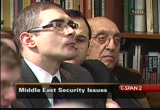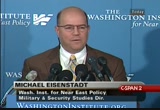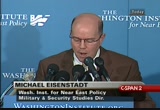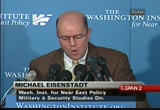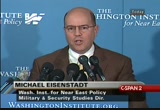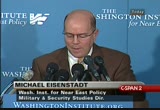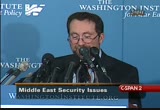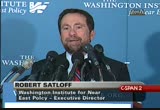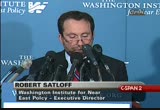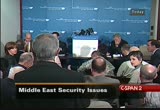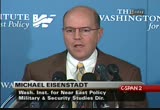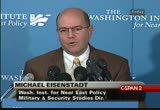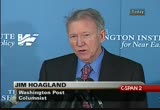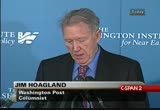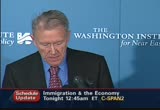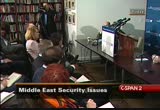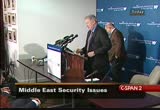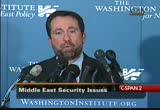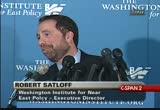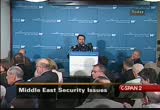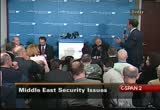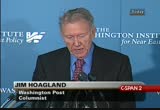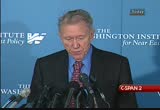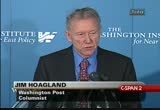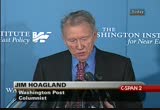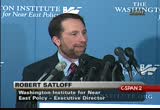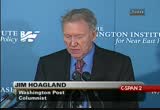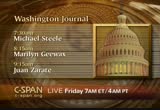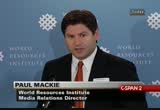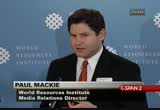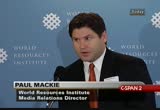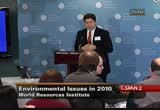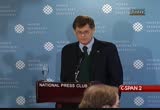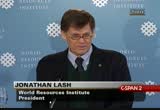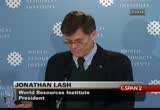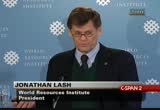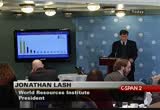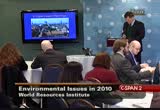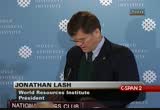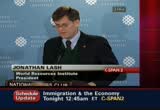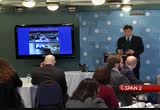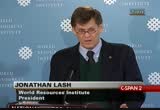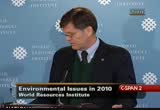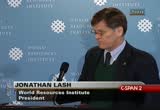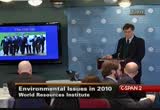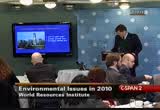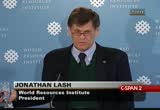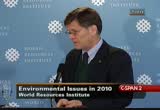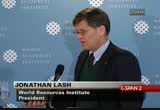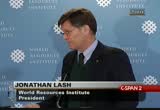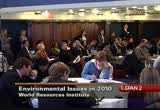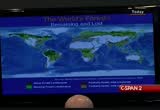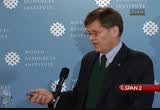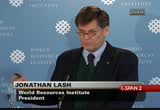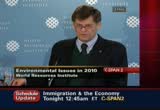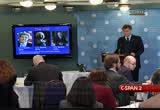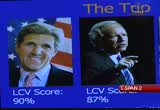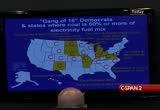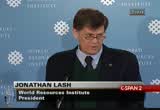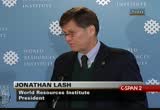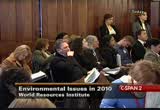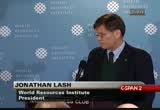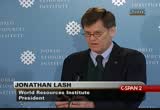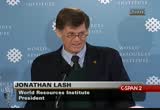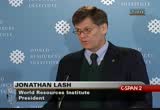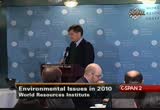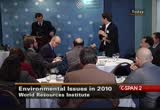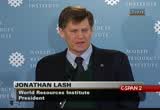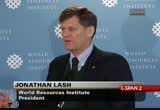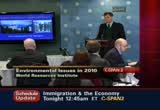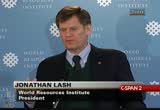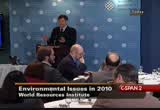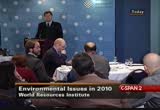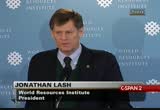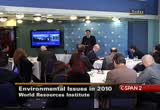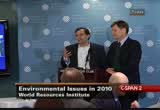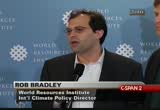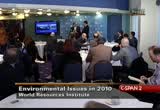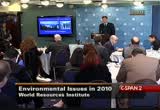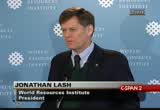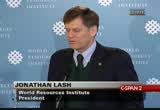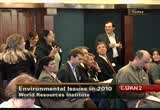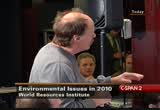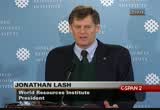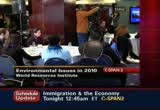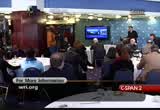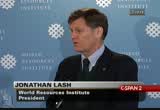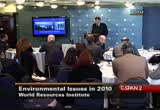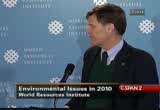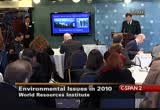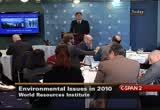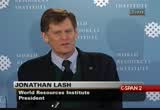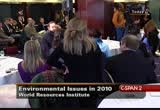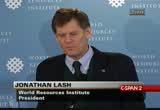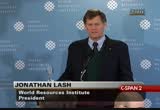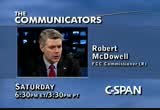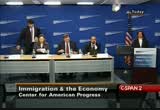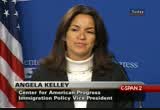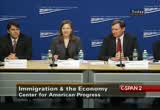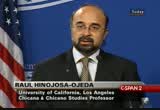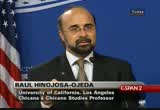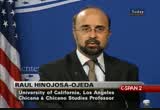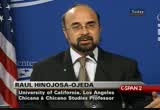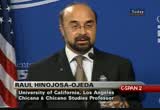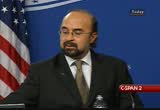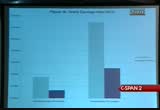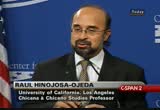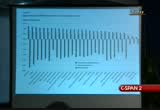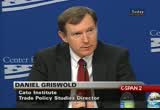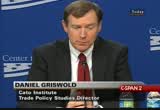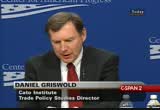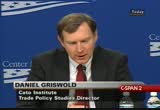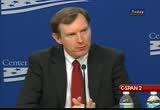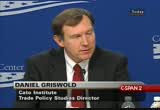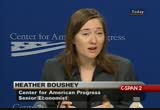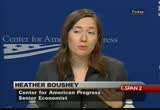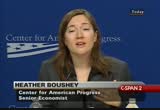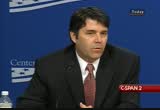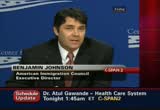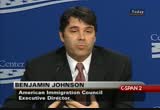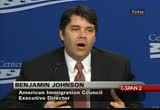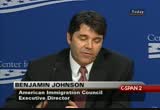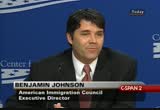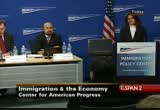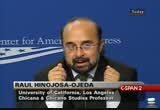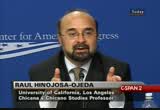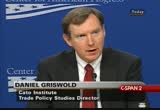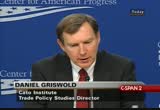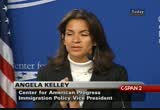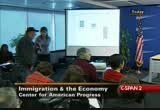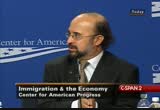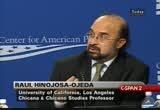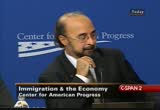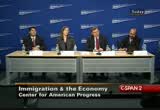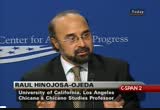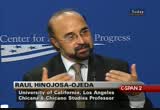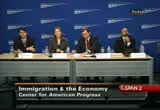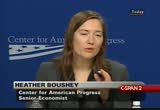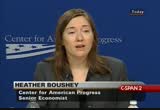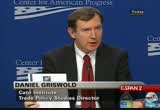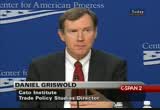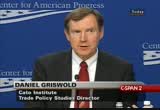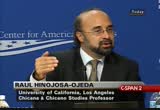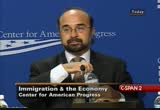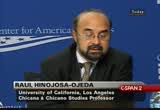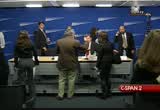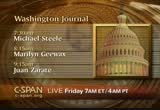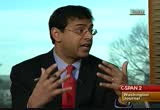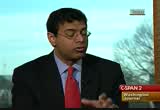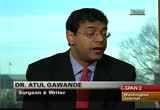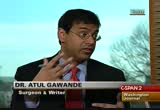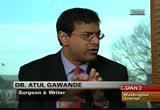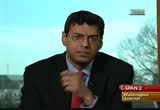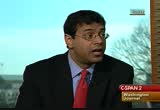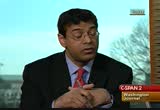tv Capital News Today CSPAN January 7, 2010 11:00pm-2:00am EST
11:00 pm
at least some senior decision-makers to believe this could be replicated in iraq relatively easily and with little cost. on the other hand, the preparations for iraq and ongoing military operations in iraq sapped or kind of burned up all the oxygen in the room and sat the lot of resources from afghanistan which could give been used to stabilize the situation there and perhaps lead to a different outcome then we are facing today. likewise again the success of the surge in iraq has encouraged the belief that we can perhaps replicate the success is at least a short-term successes we have enjoyed in iraq and afghanistan and looking forward i would venture to say that how the drawdown, the elections in the drawdown in iraq this year ago will affect our ability or
11:01 pm
the administrations ability to carry forth its policies in afghanistan both in terms of the impact that perhaps success or greater instability in iraq might have on the support for the war in afghanistan as well as perceptions of our enemies, the taliban and al qaeda about american staying power and their ability to achieve their objectives. so, iraq and afghanistan will continue to affect their reciprocal influence on each other for the foreseeable future. with regard to iran, i would summarize this coming year as follows into fill the gap as jim said in the admiral's presentation. we are either going to be dealing with crisis and coalition management in terms of how do we deal with our demands for support for the domestic opposition as well as how we deal with our efforts to put together a coalition if you will to kind of ratchet up diplomatic pressure on iran.
11:02 pm
again that is not quite admiral mullen's lane but has had an impact. we will also possibly dealing with consequence management, the potential aftermath of the israeli military strike on iran which will inevitably in some way or another impact america's security posture in the region and will have to deal with the possibilities, since people such as myself believe if we succeed preventive action cannot be an offense but it has to be a sustained policy after the first action, does the united states then support future actions or does it say never again, that this cannot occur again? all the while dealing with the aftermath of then is really strike and the implications that entail. finally, if this does not come to pass, and iran, diplomacy does not work in israel does not
11:03 pm
strike then we are going to be focusing a large part of the coming year and afterwards on confidence-building and reassurance among our allies as we try to build a containment regime to deal with nuclear iran. i would raise the question one of the main challenges we will face in confidence building is how to convince the allies that a country that was unable to prevent iran from achieving the outcome we defined as unacceptable, that is acquiring nuclear weapons, will also be able to have the willpower and resolve to deter nuclear iran and we will face challenges in our theater engagement strategy and trying to build a containment architecture to do with nuclear iran if that comes to pass. just a couple of quick comments about the whole issue of strategic communications which is an issue that admiral mullen raised in an article in a few months ago in the fall which i old recommend you read and i am glad to see he is hammering away at this point because it is
11:04 pm
something which really deserves much greater attention and focus not just in terms of american opinion but even more so in this is something he did talk about, in terms of our strategic communications in the region. if you look at the military literature that this thing coming out of the wars in iraq and afghanistan, in fact i didn't do a count of the articles but i think it is my impression that there are probably more articles about information which is the way the military does strategic information about any other subject but it is because one of the things we have learned is in this particular cultural milieu, information has an impact, a dramatic impact and perhaps is in some ways the most important tool we have in dealing with counterinsurgency, and influencing perceptions of allies as well as enemies.
11:05 pm
the problem is, this is an area where we used to be very good in this area. weiss to be very good at what we now call today strategic communications. it used to be called strategic influence or psychological warfare. it is something which we should have a natural proclivity four, given hollywood in medicine avenue, and it is vitally important to the success in the reason that we get better at it but they are all kinds of cultural obstacles as well as organizational obstacles to succeeding and we have to find a way. this is, i will say unexploded capability but it is a undervalued capability which we need to do a lot more in order to, the one element of national power that potentially could yield big payoffs in this part of the world and the military people in the region get it and they have understood how to do
11:06 pm
it and they are doing it very well but we are not doing it very well on the strategic level and in washington and we need to do a lot better than we have in the past. the final comment that will make is-- which is the arab-israeli conflict. deese to be any kind of talk of this sort would focus elise the fair degree of time would be focused on the arab-israeli conflict. i understand this is an area where the state department has the lead, but clearly in the past this is something which the d.o.t. did devote a fair amount of time in sticking to, but it is clear now with two plus wars further east and in dealing with the issue of iran and iran's the clear program the arab-israeli conflict does not loom as large in the mind of some other policymakers as it used to and it reminds me of a comment made by james wolfensohn after you left his job as represented in
11:07 pm
an interview with the israeli paper where he stated and i quote, there has to be a moment when the israelis and palestinians understand there a side show. the real global politics and the politics of four in the politics of nuclear weaponry and the weight of the population. i think that is the point that was further driven home by admiral mullen's, tears today and i look forward to discussing these issues in the q&a. [applause] >> thank you. just to add to both my colleagues, on mike's less point if you had mentioned the absence of the reference i was going to mention that myself and in a military context it does also have implications because there are at least three possible military implications that we can think of. already in the last administration there was some discussion about polling the
11:08 pm
american forces from sinon, forces that might be used better elsewhere, some more suggested. bethany but a dozen of their american forces in the sinai that help control. secondly there was considerable discussion recently about the potential for america and/or nato playing a role in terms of the final resolution of the israeli-palestinian conflict and then third for many years there has been discussion of the potential american lead role, multinational role at the golan heights so one can imagine in an era of peace in a lot more than some parties would like to see america play world precisely at a time when as you say horridly tea implied by the absence of reference, the stamina to take on these initial roles certainly may not be there. the other point i wanted to make is very interesting jim, your focus on strategic
11:09 pm
communications in their reference to the administration a mullen's roland "the daily show" because the article that, to which mike made reference that admiral bollon road about strategic communications isn't that the powerful critique of how strategic communications have come to dominate axe of policy. i will quote from it just for a moment. and the strategic andification-- this is admiral mullen's article, i noticed a term of reference is probably here to stay. regrettably it has grown too much a part of our lexicon. to put it simply we need to worry a lot less about how to communicate our actions and much more about what our actions communicate any say that in the context of almost doing the exact opposite. as you say this administration is focusing so greatly about.
11:10 pm
lots to talk about. let me open the floor for your questions in your comments. yes, please if you would take the mic. >> jim, you mentioned a vacuum of information by iraq and mike you talked about the strategic architecture in the gulf to confront a nuclear iran. i was hoping the admiral would hope this understand what the secretary met when she talked about the possibility of a defense umbrella among our allies in the gulf to confront a nuclear-armed iran. i haven't heard anything on that sense. who is in charge of the strategic plan-- on iran? >> the short answer is i don't really know what is being done. and of course i assume any
11:11 pm
planning that is being done would presumably be done by centcom and consultations with the joint staff osd end state, but i think this is one of, secretary of state's comment and the reason why we haven't heard anything more about it was recognized as premature and potentially having a harmful impact on perceptions of allies in the region who are looking at iran's. and the nuclear rina and reconsidering their own options and the challenge we face in dealing with this eventuality is on the one hand we can't afford to do things which send the signal to our allies that perhaps we are acquiescing into eventuality of a nuclear iran. on the other hand there things we need to be doing now to lay the groundwork in case that is where we end up and how you kind of strike the right balance is
11:12 pm
you know, it is doable but it is a challenge. but the bottom line is there is an architecture in place that was built mainly during the 90's in the wake of operation desert storm in terms of a web of bilateral and multilateral relationships with the gulf states. which we can build loan and which is mainly in the conventional arena and there is a very solid foundation they are so there's a lot that his already been done that we can build on. the question is what role do our nuclear weapons play in the event that iran acquires nuclear weapons and i will just say simply that i think we need to think long and hard about this because the context is much different than that of europe and i am not sure we have thought through all of the implications of changing our declaratory policy in this area and therefore it is better that we think through all the
11:13 pm
implications before we make statements about our willingness to extend the nuclear umbrella to the gulf. >> i think there are some interesting continuities on this point. during the bush administration there was discussion about a nuclear umbrella, a doctrine that would be directed at reassuring arab states in the gulf, arab states at large that they would be protected against an iranian nuclear weapon if it came into being and therefore they did not have to develop their own. it was also directed towards turkey and i remember a conversation i had with prime minister degaulle at the time about whether not turkey was interested in acquiring nuclear weapons. he said we understand in the united states we have protection on this front. i think that no longer necessarily applies but it was an interesting insight.
11:14 pm
secretary clinton had talked during the campaign about the strategic umbrella for israel, specifically. which would-- i believe she specified and i may be wrong but the contacts made it pretty clear, and so that is really the question in faultier, if we have a strategic core defense of the umbrella, it is an effort to prevent the arabs from going nuclear on the one hand and reassuring the israelis that they don't have to strike at that particular time. that seemed to be the emphasis. it is clear now that it would be much more difficult than it would have been three, four, five years ago with the arab states because as a senior arab political official who was in town recently said to a small group of us, it is clear that there is already activity underway on the arab side on developing nuclear weapons.
11:15 pm
no details to provide. rob, can i just also, i think this is a good example but i didn't quite expand enough i think on what are the costs of the kind of paying more attention to communications of the statements than the policy itself then i think it came out very well in the admiral's remarks particularly in his response to steve's question with the first part of his remarks admiral mullen was telling us that he finds a great fear when he talked to pakistanis and afghans about you are going to leave us again and he is telling them nope, nope, we are going to be with you this time and then when he is asked by steve why is it different, his answer is we have no intention of staying. we have no intention of occupying the country. indeed the message from this administration is that we will,
11:16 pm
to the afghans, we will leave on deadlines that will be primarily said unilaterally. they can be flexible, but the message-- there is a message dissonance here because the president is speaking primarily to the audience when he says we are leaving, and he is speaking to the afghans when he says we are staying but of course both audiences hear both messages. >> allen, up in front. wait for the mic. >> whitney admiral spoke-- [inaudible] the question i have is what role does saudi arabia play in supporting us in the fight
11:17 pm
against al qaeda and other stabilizing forces and how sensitive is it to them? >> gentlemen. [laughter] >> i will just say that i have enough trouble keeping up with iran and iraq and therefore, are you sure you don't want another go on this? >> i am sure. well, it is a great question. it is exactly a key question. the saudis have been forced to do a lot more than they did when essentially they exported out qaeda so they didn't have to deal with that. and, i haven't been to the kingdom and quite sometime so i am reluctant to tell you what the situation is but i think by and large the saudis have become more convinced of the need to
11:18 pm
act on their own. i am not convinced it is a fully integrated action with us as much as we would like but i am weak on the details on this. but i share the question. >> actually, just on this we do have scholars who have followed quite closely the saudi fighting with the insurgents around the yemeni border, and the huge amount of saudi fire power that had to be brought to bear and the large number of saudi casualties as far as i understand that the saudis for in this fighting, which on the one hand underscores the saudi willingness to throw assets, something on the other hand that underscores that these are not, that these are, these are rather capable insurgents that were able to take on and military forces that have received billions and billions of dollars
11:19 pm
in assets over the last couple of decades. [inaudible] >> no, no, no all in pointing is the saudi willingness to get engaged in yemen. we saw this in recent months. what we haven't seen is what the saudis are willing to do to help fight the al qaeda on the other side of the wall. what we do know about is that the saudi rehabilitation program, efforts to exploit that to yemen not so successfully, but we do have a yemen expert here, a former ambassador. ambassador bodine would you like to make a comment? >> i think there is somebody down here with a mic. i think thank you for making point to the extent the saudis would get engaged. >> take the mic over there.
11:20 pm
barbara, stand up so we can all see you. >> thank you barber for making the point this out the engagement has been against al qaeda. there is generally not a problem with the saudis involving themselves in yemen. the question is whether they are a constructive force and often they are more of a destabilizing force than they are constructive. i don't think it would be very wise for us to go to read their the yemenis or the saudis and suggest the saudis become the proxy for fighting al qaeda. i think it would exacerbated the situation very badly. >> josh rails up in front. >> thank you all for your time. there is a first national debate right now as everybody knows in this room, about whether this really in our national interest to be in afghanistan. what there doesn't seem to me to
11:21 pm
be as much a debate about edley is from what i am reading is whether the assumptions that are underlying our strategy, how are they formulated, how accurate they are, what is the basis for them and i was wondering if you gentleman could comment about some of these assumptions, for instance pakistan will ultimately be infiltrated by the taliban if they prevail, that the taliban is not, that they are more welcomed by the afghan people, which the admiral reference but i wonder about some of the assumptions that under the commitment to human and financial resources to that endeavor versus some of the other alternatives. >> we know a good deal about the process by which these assumptions are formed and articulated in the meetings with the president. they had almost a dozen, maybe
11:22 pm
ten meetings of the national security group to talk about the search and other aspects, and we were told in great detail about how crist the meetings were, of the president's very laudatory questioning and making people state their views so that nobody could leave and say there he was never heard and they didn't have a thing to say. it is a lot less clear exactly whether those assumptions are a joint project because we do know there were differing views about whether not we should try to keep their restricted footprint or try to go in with the surge and the president at the end of the day to some extent with the difference the little heavier on the mcchrystal side than on the biden side, but i think the basic assumption is it would be a disaster to be seen to be pulling out to be cutting and running. i think that is a basic assumption so therefore i think we are there for a while. we have to manage our presence
11:23 pm
there, to meet these two contradictory messages that i referred to a moment ago. we are not staying, but we are not leaving. and there is a lot of tension between those two messages and it takes a lot of time and effort to balance that. in terms of the assumptions about pakistan, yes i think one of the things this administration has done very well as to articulate the importance of pakistan and adam ramallah and has done that very well to say we cannot solve the afghan problem of we don't get full cooperation from the pakistanis and we are getting a good deal more cooperation, pretty much in terms that allow the pakistanis to give us things that buy them time. they are also in the time by a game. everybody involved is in the time buying game but i think the president has done a good job of forcing everybody to articulate their assumptions so he can examine them and then make the decisions. i am just not clear exactly
11:24 pm
where the wait is on each and every point. i don't know if that is responsive to your question or not but that is just about as good as i can do. >> wirer those outcomes assume to be the case? what is the reasoning behind it and what that support their reasoning? >> a lot of the of course based on intelligence, probably too much. i think one of the things we see in this case of nigeria is there was a lot of information out there that was not highly classified and therefore might not have been taken as seriously as it should have been. so, it is clear that there was a difference of do you and i think they are probably still is in digits from time to time over whether not the taliban itself represents a direct threat to the united states and therefore we are required to stay in afghanistan come what may. i think there are people who are involved that may be believe that. i don't think that was the
11:25 pm
consensus judgment by the president. i think there is going to be as part of this new effort a concerted effort to peel off the taliban, to not make peace with but to develop perhaps a living glat lived in some of the provinces with the taliban if we are convinced they will prevent al qaeda from returning. i guess the key question is do you believe that the taliban becomes again and even more important influence and going to the point of taking over afghanistan, does that mean the al qaeda will then come back? that is one of the assumptions. you can say yes or no and you have your assumption. i think the assumption by the administration is that we can't risk the taliban coming back because it is still possible that they will invite al qaeda back in, that they are in fact al qaeda under dies. i tend toward that you so i give that you the promise but it is
11:26 pm
quite possible that that could change as we have more experience in trying to establish some kind of notice with the taliban. >> jim, let me close by asking one last question. don rumsfeld made it famous distinction between now and the nuns in the unknown unknowns. i've not going to ask you about the unknown unknowns but i do want to ask you since this is our opening event of 2010 as you look over the course of this year, what the among the panoply of known unknowns that could be hitting the headlines over the course of this year and the part of the world we are focused on which of those do you think will rise to the top of the list? >> one that springs to my mind right away that i don't think we know nearly enough about is what is going to happen in egypt? if you look at what happened yesterday on the gaza frontier, the killing of an egyptian
11:27 pm
security officer by fire from gaza and the great turmoil that is going on there and if you look at mubarak, you look at the political uncertainty around the succession there, i think egypt is a huge unknown unknown and could have enough people there could have an enormous influence. the other one of course is more known and that is iran, how close are they, what red lines have the israelis drawn, how well did the iranians understand those red lines and there's some hope i think among people that they do see, most of them, but iran this the other great one. >> ladies and gentlemen thank you for joining us for this very special event. thank you, jim. [applause] [inaudible conversations]
11:30 pm
11:31 pm
seventh annual environmental stories to watch. rich i have had the pleasure of being a part of to help organize for the past six years and it just a little back story it was scary moving from your side of being a journalist which i was for about 10 years at the daily newspaper to come over to the dark side of the pr. but it was one of the best decisions i have made because it is clearly a far from the dark side we do not offer the most tasty sound bites or headlines but it is a place where the ceo and congress and leaders come to for environmental data for research they can trust and journalists have come in the same manner and we have had such as spike its coverage
11:32 pm
not just copenhagen but it is going up and up and it seems we're doing something right and that is because the staff is so committed to speaking to journalists were in the old days they would sit in the office and do research. they are still doing that now but now they are more willing to talk to the press and that makes me happy also be cuss number one, we have a tremendous communications staff is an honor to work with it is like madmen without the cigarettes and booze. we have a leadership from the first-rate bert -- board fell lets us do what we want to do just like bloomberg president and steve ross miami dolphins owner, and al gore and i can go on.
11:33 pm
third we have a president who, for years, has been telling our staff which is growing to communicate and do it well. it is great to be with you and our great staff. before i call up jonathan lash to speak just a couple of logistical things. turnoff yourself of. he will speak half of the times "60 minutes" then open it up to answering your questions. you have myself end jessica over there in the black will have microphones the way for us speak into a microphone and the state your name and media affiliation. we have tv cameras here. we also have quite a few
11:34 pm
journalists on the phone line so they can hear us but we cannot hear them. jonathan lash president of the world resources institute since 1993 and a long list of accomplishments and affiliations which you the website but one that iof particularly like he was sort of happy but not thrilled by "rolling stone" magazine called him the top 25 climate warriors and he rose and not thrilled with the honor but when a daughter said he had read the article that you are kind of cool that is quite an accomplishment and i think it just goes to show if there is anybody from teen people or "ok!" magazine talk to me and i will get you the interview.
11:35 pm
[laughter] jonathan? [applause] >> thank you. do not forget your notes. good morning. welcome everyone. this has become an institution in to start the talking about issues to watch. this is not the morning for an intrepid predictions. we don't try to tell you what will happen, we try to talk about the things that are worth watching world where the story is likely to be merged, whatever the outcome. also it is not an opportunity for us to talk about what should happen. of course, this is washington and we are a mission driven organizations will not try to pretend everything i say is free of spin which is the city's leading business and communication but we do try
11:36 pm
to give you a sense of where we see some of the larger issues will play out and whether that key hooks you could watch for? not just a product of my own analysis but the staff has become involved in this exercise of reflects said judgments of a number of my colleagues several of whom are with us this morning. i went to start with two updates from previous years. last year i talked about watching for the beginning for the enforcement of the new the revised congressman macy act. he was a republican from speed 31 if dieter roosevelt's classic -- closest allies in
11:37 pm
the day of the conservation president. one of the pieces of legislation that he sponsored was a law that enabled federal agents to prosecute those who took the animals in violation of state laws because there was a raging trade of illegally take did the game animals. that statute had been in place and used occasionally by wildlife agents for nearly one century wedd in 2008 congress revised it extending it to cover trees and trees taken illegally in the country of origin. we said watch for prosecution under this statute for the first case of would be brought into the united states in violation of this statute and talked about the very interesting
11:38 pm
network of citizen enforcement with our and a medical expertise. and the justice department. a few months ago federal agents armed with a search warrant raided the premises of a very surprising would fade qatar that prided itself trying to use good wood supplies seizing evidence of tropical hardwood illegally harvested from madagascar are. continuing to watch this space, i have reason to believe there is more in the pipeline coming the l.e.t. act have an impact because a few prosecutions up the supply chain it is becoming
11:39 pm
important in a variety of areas ranging from car been to would supply a two other materials. this is a real indicator of the potential for enforcement of a standard at the end of the supply chain to bring changes write-up through the supply chain because suppliers of what are now subject too extremely stringent reporting requirements and it is raising questions about how it complies. several times in previous years who i love chesapeake bay is the question of whether there will be innovative action in our watershed and to protect the chesapeake bay one agree estuaries in the world from their rapid buildup of
11:40 pm
nutrients which is undermining the health of the bay and we have suggested there is a real potential for demonstration of a new approach in the chesapeake for nearly 40 years as long as that the federal government has been actively enforcing the clean water act there has been an informal system, industrial discharge was subject to strict regulation there we're helped with federal funds to abate pollution and nonpoint sources like agriculture or the suburban development were not regulated. senator cardin has introduced a piece of legislation that would take a different approach and look at the whole system and how to both most effectively and fair and cheap reduce
11:41 pm
the flow of nutrients into the bay which is 46% agriculture and 1/3 municipal sewage and runoff and the rest from industry and a variety of other sources. what is interesting is the triple win opportunity. if you can see the screen you can see that toolbars on the left-hand side is the cost of abatement for a municipality. very, very expensive for municipalities to make that in infrastructure investment required to reduce nutrient uptake in the day. over to the right are a whole set of very cheap land use practices that offer e enormous potential for abatement. this is a classic situation to set up a trading system.
11:42 pm
if the sources on the left can vary chiefly get larger reductions then they would by investing in infrastructure to pay for the sources on the right, they gain a source of and come pollution is three juiced and pollution of the left gains cuts to have a cheaper opportunity for reduction. of this bill is likely to begin to move in this congress and senator cardin has taken this as a high party is in support of the delegation. it will be interesting to see what happens in the next few months with the environment and public works. the big story obviously is the climate story with what happened in copenhagen a few weeks ago.
11:43 pm
i have said astonished watching of the global spin after the copenhagen meeting. what happened there is perceived completely differently in europe than here and entirely different the in india they add it is in europe. if you track the flow of blogs and columns coming across on the assessment it ranges from catastrophe to success. there were two copenhagen meetings is my cents per cup there was the formal treaty negotiation going on essentially since the united states climate change was ratified by 190 nations back in the early 1990's. and culminated in copenhagen. there is a very brief 12
11:44 pm
hour head of state negotiations up the first negotiation the formal one failed. level talk about that more in a moment but i would give you some background to what is happening there. every discussion of international climate change negotiation over the past decade has taken place in the context of the kyoto protocol. and the assumptions created by the kyoto protocol that industrialized nations have the obligation to reduce pollution and decisions of how to proceed on pollution reduction would be taken in five-year increments called commitment point* this second point* is what was under discussion at copenhagen.
11:45 pm
and the international agreement would have an elaborate legal structure with which commitments would be carried out. certainly over the last two years there have been very strong assertions that that would be the frame for the discussion. remember coming out of bali two years ago? united states was shot down in developing countries continue to insist they have no obligation to make commitments. but in the last six months some very unexpected commitments demerged from levying could trees brazil mexico china suffered that and finally india announced explicit concrete quantitative commitments to control emissions and many of them in terms of mission intensity not absolute levels but an extraordinary
11:46 pm
change from the form of a conversation before and lead to significant optimism going into copenhagen. and optimism that did not play out as the negotiations went forward for the first 10 days. those of you that revers know how sour the mood became by the second week it was hour outside where danish police were battling protesters and it was our inside where negotiators were not only failing to reach agreement the playback from agreements that seem to have been there. on the the second and two last day by the final friday of the negotiations, the major countries were represented an been
11:47 pm
absolutely unprecedented negotiations in began from heads of state who were not letting the negotiators take the lead by trying to resolve the issues themselves. that also appeared to fail. there was no break in it the deadlock and then a meeting occurred which everybody followed copenhagen and which president obama joined a meeting, and end of that group did break the political deadlock and reached agreement. which broke through the failed expectations in terms
11:48 pm
of funding and a reduction in commitments and the conflict between the u.s. and key developing countries over verification. the agreement included a 2-degree target, a significant step beyond what had ever been in the kyoto protocol but excluded the implementation of that target through 50% reduction of global emissions and 85% reduction in industrialized country emissions. it included commitments by all of the major sources of the missions north and south park a remarkable but if you add them up it is not enough to have led to a degree target. it included provisions for verification of the implementation of those commitments and countries have to provide background information and respond to
11:49 pm
questions. it reflected progress that had been made on us that the key issues ranging from deforestation to technology to adaptation funding, but did not provide a viggo basis to lock those into place. it provided a guarantee a $10 billion per year in funding for the purposes rising at 100 billion per year by 20/20 but did not provide explicit information as to the source of those funds or by the means of which those would be committed. if you hoped that copenhagen would result in a legally binding agreement that would assure we would meet the goal too not have a global warming exceed 2 degrees it is a failure precut you
11:50 pm
believe the only way forward is to include the united states and developing countries in the keogh architecture it is certainly a failure but it does offer interesting possibilities and changes. first of all, in terms of who led the process? this is the mga to meeting 2008. these are the guys over the course of the decade since the second world war have basically run the world and have gathered periodically this is where decisions could be made. these are the men who reached agreement in copenhagen. this is a new world order and more than half of the rhodes population, more than half of the missions, but
11:51 pm
but not the old alliance reflected g8 meetings. an extraordinary and powerful change and indicative of something much larger going on. these were the leaders who were able finally to break through the disagreement and they represent all of the major developing countries over whose emissions a lot of the tension has arisen. i am sorry. it was a heads of state agreement not environment ministers or negotiators. as far as i know that is a first. this was an agreement that included everyone and rough commitments. that is absolute.
11:52 pm
this is an agreement that provides for verification of compliance and i will be happy to talk more about this later with the verification process of it is real bad is certainly a first. this is an agreement built around the idea of eight to do agree target. we certainly would have liked to see something stronger than that and the 50 percent included but the include sinn is absolutely a first. this is an agreement which became the copenhagen declaration through a process that broke through the dysfunction that led to a stalemate 24 hours earlier. this agreement was taken to a larger group of heads of state and then to the conference floor and because they could not get the
11:53 pm
necessary unanimous agreement on a conference floor, supporters of this agreed that conference would take note of a declaration that would be joined by those who were willing breaking through 15 years of dysfunction and with u.n. negotiating process. this is not a legally binding agreement we do not even know if everybody will stick to it. we will get strong indications over the next four weeks china has convened a meeting president obama negotiating partner will discuss this agreement and what comes out of that a couple of weeks from now countries will declaring it that is a participant record january 31st of countries
11:54 pm
are due to submit their commitments to complete an annex to this declaration. if that was then it is a strong indicator the agreement israel and the heads a statement with they said they will continue to implementation and if they don't come it will be a signal it is beginning to disintegrate for about it is completely unclear who owns this agreement. what is the process? who decides how you go out and who can can be meetings? that will be resolved over the next six months. will this process be included in the upcoming scheduled negotiating session in the spring? or is this a separate process? will the u.s. can be in a major economies four of as a way to drive this forward? all of these are likely to
11:55 pm
emerge in the next two months. it will set the course for whether this is a platform for global action to address climate or a failed political exercise that was just designed to avoid having copenhagen be a complete failure. one important question that i would do with is how will the u.s. proceed? but obviously everyone will be watching china. here are some indicators you can look for. actually, one week ago china announced the change in its head utility law that now requires chinese utilities to purchase renewable energy that is being produced and offered on the grid. this has been a problem where they were rapidly
11:56 pm
growing at renewable capacity but not purchasing the power. china has a history of phasing out inefficient old power plants and building more e efficient one's. effect continues it is a sign they will try to implement car been intense and a commitment. if that does not continue, it is a sign they have pushed the commitment second but by far will be the adoption of the 12 or five-year plan it in the spring. if the 12 for five-year plan includes a continued strong improvement from energy efficiency and commitments to pollution reduction and carbon commitments it is the irrefutable sign the chinese are taking this commitment seriously. i think it will. what other issue coming out of copenhagen is a forest.
11:57 pm
i have talked often to you about the long history of global deforestation. the forces that are driving that it was the opportunities for reducing deforestation it gives you the sense of the 50% loss of forest and what has happened to those formally forested lands. the other was what kind of program reduced deforestation and degradation that would be adopted as part of the climate's game. could northern countries and companies in those countries pay for reduced deforestation the credit to meet obligations? something strongly supported by those countries in the
11:58 pm
u.s. that have been advocates for climate action normally that is deforestation and focused on a relatively small part of the world and that amazon piece and indonesia, the congo basin. and copenhagen it was clearly added it expands the regime to cover reforestation. that is coming the other 50% of the land that was once forest. this option is quite interesting. first of all, the problems of tracking it are less than the problems of dealing with the deforestation. it brings large deforested nations into the
11:59 pm
game, china, india, south africa, key players that could not play in but deforestation game and because it is a forestation, it restores water flow and provides jobs it improves ecosystem we have an interesting project going on to get palm oil for biodiesel to think if you can make it degraded lands an opportunity the carbon absorption comes a significant opportunity it was a meeting and logan -- in london there is
12:00 am
a red plus institution it agreed to in the copenhagen declaration, we are likely to see this year rapidly version of under this set of provisions. there was one a few days ago and holidaying cherry trees and a company called eco- forest and carbon tax. we will see more of this us the opportunity of reforestation becomes more real. okay. for a decade the real problem is the u.s. was not addressing climate change and we still face the issue and how we will meet our commitments the president at the end of the meeting talked about between 14 and 17% reductions.
12:01 am
because it did not offer any commitment and it would leave members of the senate letting the administration feeling i got ahead to the right two the senate to make reductions. at the same time it needed to get an agreement and the other countries agreed to verification. we're not offering much been asking for quite a lot. a difficult tightrope that the president seems to have walked very successfully but now put the spotlight back on us. can this strike of senator graham and lieberman and carry fashion the 60 votes climate and energy bill? they have talked about it generally how they will do with and senator graham says
12:02 am
it has to be a security and energy competitiveness bill. he's talked about strong nuclear provisions opening offshore leasing that is taking too hot button issues and give the republicans in the us senate big victories to the hot button issues. there are obviously obstacles and suddenly it is back on the agenda but i think reports of the demise of climate legislation have been greatly exaggerated. i want to talk about why a little bit and some things to watch for. i actually showed do this map last year but it is still the key. the state's colored and are the states represented by democratic senators who have
12:03 am
said yes we think energy and climate change are important, but we are reluctant to vote for a bill that looks like the bill that the house passed. of the state's with the electors see are those in which more than 60% of the energy comes from coal. this problem is still very much a problem about how we address the concerns of the states that are supplied with electricity by coal and in terms of cost or old industry or in workers of the coal industry. of course, it jobs are also an issue of major concern for every senator. i just point* out the state's colored and are those with above average unemployment parker you cannot exact a trend that
12:04 am
starts with higher unemployment because california is included an rhode island is included and those senators are certain to support strong legislation. this is really about bearing the cost of offsetting the cost of changing our energy supply system. here are some things to watch for. the first is if the trick up produces a more fleshed out a draft bill and put out a concept paper before copenhagen and can they figure out what they need to put 60 votes and put into legislative and four? the second question is if senator baucus holds a markup of that legislation in the finance committee. that is the next top for legislation.
12:05 am
senator baucus said he intends to take it up he has other priorities. he certainly has not focused on it if it appears not to be going anywhere city has the markup is a strong sign that it is a live. the third issue that all if you are aware of and coming up much more quickly as the boat on senator murkowski amendment part of the agreement on health care was that she would have the right to offer an amendment which blocked epa implementation which is prevented epa to move -- removed greenhouse gases under the supreme court petition saying they are pollutants under the clean air act. the votes on the rakowski bill will not be a surrogate for a vote on a climb a bill since there are a lot of senators who are very uncomfortable on climate him
12:06 am
a still support a climate bill that will also limit what the epa would do but it is a serious challenge to the nation's ability to go forward if there is not legislation. if indeed, it will be a busy spring for that epa. they are locked into the issue of regulations implementing the agreement of transportation or auto economy standards could then proceed with proposals on the stationary sources. designed to brush up on your knowledge of what batc means. i will not run a tutorial but the processes grinding forward and will have a huge
12:07 am
impact on industrial planning and maintain the endangerment finding and much of that is scheduled to come out during march. some people thought lahood could back off as the politics continued to move ahead. the northeast states are going to adopt a standard and california agreed to bring its standard in line with the national standard through 2016 is intending to adopt a stricter standard at 2017 and beyond. the three regional cap-and-trade programs in the midwest are beginning to
12:08 am
coordinate their actions and states you are facing permit decisions as to implement years of the clean air act are becoming creative about how they apply the clean air act provisions. there was recently a permit to for a new coal plant in kentucky that is held up using a natural guest instead of coal. this will happen in the spring as well. i think march/april will be interesting and decisive with epa pushing forward, the state's acting aggressively, and the senate reaching the point* to fish or cut bait to move a bill. and one other thing, about 7% of u.s. emissions come from the federal government. that is a rough estimate. two days ago, all federal
12:09 am
agencies were due to submit their plans for reducing their own images under the executive order that the president adopted 90 days ago. these are supposed to be fairly aggressive reduction targets that affects the ability to achieve the kind of reductions being asked of the rest of the economy and sitting there. i cannot get them to tell me what they have got. you go try. that is the important indicator. speed mail . >> what can they do about in direct use of energy? and one last point*. about old arrangements changing i talk about the g8 being displaced by this iowa. during the course of the economic crisis of countries
12:10 am
to have greater representation of the imf came to a head as meetings are convened on how to deal with economic crisis and china india and brazil and others demanded a greater share if they would support strong action. the resulting agreement which had a $1 trillion prop up for the imf is going to give those countries, who were not part of the original club, that created the world bank and the imf had a meeting in britain would new hampshire in 1944, give them 47% duty rates and that is likely to rise over 50 soon.
12:11 am
just as those institutions are becoming important in a series of issues of our resource use, it means the resource producers are likely to have a much greater voice investment. just as the world bank system is playing a larger role with implementation of climate decisions decisions, developing countries are demanding a much greater say something that more reflects c5 rather than g8 in the decision-making process. historic plea and matt environmentalist tried to use the international institutions to impose environmental standards on developing countries as the price of getting financing. very interesting to see how that plays out. those countries now have close to majority voting rights.
12:12 am
watch for this to apply at the spring meetings of the world bank and the power arrangements will change completely and by the way the u.s. will no longer have the capacity to control who is named president of the world bank. what that i will be delighted to take comments or questions. we cannot hear from the people listening by telephone? >> if we have time at the end. >> you get the first question every year. and. >> i am with platz. mentioning the domestic situation in the copenhagen accord, i suspect that you are for cap-and-trade legislation you would still be for it and if you are against a you still would be against it despite copenhagen. there is a group in the
12:13 am
middle of the deciding vote how will impact of that group's ultimate decisions? >> i think the u.s. delegation went to copenhagen with the one rule in mind of do no harm. they did not want to do anything that turned a possible yes go into a new low. they achieved that. second of all they knew they had to provide some answers to those that were concerned that china would not do anything and if their promise to we could never verify it. there had to be a verification system and the one that is proposed and the declaration that china agreed to is unprecedented. you need to understand that this is different from weapons of mass destruction. people tend to think of verification with the
12:14 am
painted suv going across the desert looking for the smoking gun. we're looking at the entire economy and the way it works. the data needed is not specific data about a particular facility but a broad scale data of the performance of an entire economy and energy consumption and policies and whether they're being implemented countries are required to provide the backup information and answer questions about that information. that combined with the fact that we already have an enormous presence on the ground in china, a number of federal agencies and academic institutions provides reassurance. and some of them people concern said it is a step in the right direction.
12:15 am
>> i am with the washington guardian we saw secretary vilsack ordered his staff working with epa to rework the models 44 station in the at united states. is that an indication? and to do things to sweeten the pot. >> the short answer is i hope so. this is a very tough issue over climate legislation when the agriculture committee demanded a set of concessions making get more likely that money for the offsets low into the
12:16 am
agriculture industry. added to be difficult in the senate. it is encouraging that secretary vilsack and administrator jackson are collaborating and focusing by the way on the reforestation opportunity as a place to produce offset. two create a demand with billions of tons of carbon offsets most think it will be difficult to meet all of that demand domestically some of the past three met internationally. >> that leads to my question. i wonder what is the impact of brazil pledge which is codified in the legislation in this week on the
12:17 am
availability u.s. entities under car been a constraint to obtain international offsets? to these developing country pledges translate into more domestic production in the last? >> -- in the u.s.? >> the question is if you are planning to pay brazil to slow deforestation and take credit for that and not have to make reductions for burning coal in the u.s. are you prohibited from doing that? if brazil would reduce deforestation as part of its own commitment that would be double accounting.
12:18 am
is it is certain a an important question and it is potentially at least a significant driver of price but nobody knows exactly how it will play out. >> i am with -- talking about the murkowski amendment, i do think a positive vote would give confidence to the gang of 16 who want to pursue the bill? the waxman/markey bill already had restriction these restrictions the trade-off was you have strong national legislation the recent days regulates carbon but not moving forward 70 except in specific areas not covered by but waxman march ecap burper i doubt that is the
12:19 am
trade-off it means it will be more likely to have a successful but the dynamic would be the other way. the amendment by senator murkowski can be filibuster therefore requires 60 votes to move ahead. there is also a discussion of a challenge under provisions that challenge regulations and that would only require 51 votes. that would be a leader in the year station later in the year. >> i am from voices of america and back to copenhagen and the air agreement the heads of state agreement of the protocol agreement. what is the way forward? have you expect this
12:20 am
agreement that a mentioned a little bit, how is the process for a global treaty to move forward? the house whether this agreement that comes out of the last 24 hours perhaps be voted into it? >> i will respond briefly then ask my colleague reruns are international climate program if the ones to add anything. i cannot make predictions it seems that there will be an effort to convene the major e matters and in some way to flush out what it means and discuss how to move it forward but there are pieces of it to that really need to be implemented through actions of the conference of parties to the convention. there are specific
12:21 am
references from the did declaration some o some of it has to feedback into the process. to the extent they can figure out a way to maintain the momentum of the declaration and the integration with the process will still a lot to determine how fast this moves. do you want to add anything? come to the microphone. >> good morning. has everything associated with copenhagen right now, there are variations on the theme of we do not really no. what to look out for this year is a mess but that is not necessarily a bad thing. jonathan already referred to the fact of the emerging economies and bolivia is trying to bring together an
12:22 am
alternative conference call the europeans want to convene something administerial or heads of state level. there will be a lot of follow-up on this specific second track that jonathan referred to with the head of state level. but copenhagen and what will be resolved is at the head of state level and then the more formal process. there will be another meeting at a technical level in me to me or early june and a meeting in december and that process will struggle with the question had is it absorber the directives tickets through the copenhagen accord? that is a big area but some they to watch through the first six months.
12:23 am
>> case a given example where it will spend 12 hours negotiating? >> i cannot think of anything it sounds like something out of the 19th century where heads of state could get together and stop the war but that genuinely have been here. the negotiators are not entirely pleased. [laughter] arrow be a tension between the negotiation establishment and the commitment of heads the state and that is where we have no idea how it will play out. >> leeza friedman and thank you for doing this. i have a question of the new world order or the of four questions brazil china saw that a cut and india.
12:24 am
and to talk about the bloc of countries where you saw happening in copenhagen and the dynamics between what might have been at the meeting going forward and where a day-to-day the climate talks. since we came back i have been hearing about the plans of the g20 last year to phase out fossil fuel subsidies can you talk about where that might be going this year? >> i don't they countries enter into agreements because it goes into the agreement i don't think brazil or china it entered into the copenhagen 10 declaration for any reason
12:25 am
other than concluding it was in there long-term interest in hot to have that in place. they have long been driven by and continue to believe global warming is the fault of the north. i could have put up a chart showing historic emissions and if you look at historic emissions the industrialization of the north over a 200 year point* has created the problem they point* out a poor peasant in any of their countries is responsible for a tiny fraction of the missions that an american or european is responsible for. some of that is rhetorical but some of that israel. they genuinely believe that equities fund in their favor and continue to insist it is written into the declaration that their first obligation
12:26 am
is elimination of poverty but it reflects a conclusion that the future of the eradication of poverty is low carbon development and the a gauge meant of the west to reduce emissions will better serve those interests they add not mitigating climate change. if that is so, there is reason to be hopeful about the future about the future. i would add we don't have experience with agreements personally sitting around a table together some of us quite know how committed are they? when it went back home and the ministers were not pleased how does that play out we don't know but we will see in the next four weeks. i do not know the answer
12:27 am
12:28 am
i am curious green jobs but not insulation but in terms of new technology. it seems to have former industrial states with senators in particular that would like to see your don't necessarily support cap-and-trade because of the impact but push hard for industrial or a new clean energy type technology. is that enough to make a difference over the long view of co2 reduction? o.r. without cap-and-trade? how long does it go on? and the impact it might have? >> i will respond but can i do it without cap-and-trade or a limit on the co2? one gasket answer the question about green jobs better than i could and it is unfair. do you want to have? okay. i will introduce him in a
12:29 am
moment i have not seen any analysis that suggest that we can make reductions of the scale necessary or anything close to the scale necessary through all the positive energy incentives. so have the hour rupiah's program that would be a terrific step. very good to have that. has an alternative technology. it will certainly generate jobs. there is a debate going on now about the balance between jobs displaced and created but there is a lot of analysis saying it will create jobs for ago but it does not get said deep reductions we have to achieve over the next 40 years. what is good about cap-and-trade has nothing to do with trade but the cap is
12:30 am
not a single and point* with four years of reductions that tells you something really should invest. energy alone will not do that. what of our guest is jack holliday the outgoing chairman of dupont and longtime ally of u.s. cap who has been eloquent on this subject and i want to give him a chance to comment. >> thank you. first day agree with his answer about cap-and-trade to get the initiative going. we have seen enough examples of resources need to go to the right places but every country has the same objective so little bit country that's find creative ways working with businesses but it clearly over the next three or four years the countries that can leave can created true green jobs of
12:31 am
the future. . . at the front, at the same table. >> thank you. i am suzanne from the guardian. i really wanted to follow-up on lisa's question about the change in the world order from the g8 to this c5 because specifically we didn't see at the table in that picture is europe or any european representative when they had sordid taken a leadership position. gordon brown in sarkozy endless the amounts especially. >> berry, a very noticeable. i would suggest a couple of possible explanations. they certainly were immediately included afterwards. one part of the problem is that europe was not a problem. your pad been cleared for months that it was eager for the strongest possible agreement and
12:32 am
it was the blockage was that this agreement between the u.s., china, india and so, those were the key parties who had to resolve the issue. i think a second problem that europe faces is, you still don't have a strong presidency, and so there wasn't a single leader who could play that role. it was gordon brown and president sarkozy in chancellor merkel, so there wasn't a single focus for europe to be represented and a think that led to europe and not being as unified and forceful a participant as it might have been. i think it is not only can they but i think they have to come back in and because they are still the most aggressive party, it is very likely that, in
12:33 am
making all these decisions about how this the process work and who owns the process and how you fill in the blanks europe is going to take the leadership roll. sure. >> hi, lisa lehr from "politico." there is a lot of proposals on the hill right now to an energy bill or something short of complete economy wide cap-and-trade brickell legislation, how successful will the administration have ben do you think it something passes that isn't what cap-and-trade and would that be sufficient in your mind to transition to the next page of the economy? >> so, i am shifting to span here because you are asking my opinion, right? the think passing in energy only bill would be a failure. i just don't think it sends the right signal to the economy. we have an answer the question about howie going to make reductions necessary to achieve the goals set in the declarations we signed. there are so many alternative
12:34 am
configurations of how you would work in cap-and-trade bill to satisfy some of the concerns that i don't really want to answer that question because i would be speculating. but it is very clear that the troika is going to search around for the formulation and could attract 60 poets-- votes. we just went through this on health care. they have to invent something that attracts the right number and it is likely that it has to attract five or six republicans. yes, the gentleman here. stand up. >> i was an ex-platts reporter too so hopefully we will get a lot of attention here. my question is if you can put your spin hadron again expectations for blanche lincoln for example. she seems to be under a lot of pressure to vote against cap-and-trade obviously.
12:35 am
she is behind in the polls. leshy going to follow byron dorgan's lead and perhaps announce that she is not going to run again which frees her up to both her conscience and then to cup what is your expectation for ken salazar? will he remain as secretary of the interior where could he possibly could then run for governor as he seems to be under a lot of pressure there to do so? >> you are way out of my expertise. [laughter] let's see. i hope that senator lincoln finds a bill that she thinks it is worth marking up in the ag committee that provides sufficient benefits for that constituency that she sees it as a big plus. i have absolutely no knowledge of what secretary salazar is likely to do. he has got a great job.
12:36 am
yes. >> another platts person, christine with platts, carbon market editor. >> you guys must be doing really well. >> actually energy is not doing too bad nowadays. a follow-up to the question about the necessity for cap-and-trade and then the question i have is that, is it critical for congress to pass the cap-and-trade build not energy only are some other type of dividend bill but cap-and-trade specifically in order to ease these international talks and i am specifically thinking of the carbon offsets situation where that is the main way to funnel funds and without cap-and-trade, it is essentially checks to developing countries with nothing in return. >> the most important signal is the signal that the u.s. is taking action to make the reductions that we were committed to making.
12:37 am
the declaration doesn't specify the source of the funding, so i don't think it is absolutely essential for international purposes that it be a cap-and-trade built. looks just like waxman-markey. the problem that members of congress encounter when they say they want to find these simpler approaches to find the simpler approach that meets the needs of the myriad said the fentress to have concern about the legislation. if you want to deal with call on the midwest and you were going to have 100% option how exactly are you going to do that and if there is deep concern about potentially trade and competition affected industries, how will you protect them legally? and, if there is an enormous concern about rising natural gas
12:38 am
prices, how will you address that? it turns out once you start trying to answer all of those questions to get some driven back toward cap-and-trade because it complicated in were covered as it is it provides ways to deal with all of those problems and i think that is why it is still alive. i am going to take two more questions. >> amy with national journal. thanks for hosting this. do you think organizations and others are in support of an economywide cap-and-trade can support a thune dividend bill that envisions a smaller government role? i know that happened on the energy side with the environmental groups about nuclear energy and oil and gas drilling and some of them were like will we want to concede a little bit. do you think back in happen with cap-and-trade? >> i am a member of u.s. cap and we have a very specific position in favor of economywide cap-and-trade. we have done a lot of work to
12:39 am
create a balanced compromise on dealing with some of those interests that i was just talking about. ultimately what the country needs is a roadmap and a price on carbon. we need to know that we are going to start their reductions and continue for decades and we need to impose a restriction on carbon that raises the price of burning high carbon fuels. so, if that issue comes up at some point in the future, and obviously there is a legitimate consideration about finding a way to send those to signals if the bill you are describing really did that. and you know, i don't come to the nuclear question reluctantly. i think we need to put all boccara and options on the table. i think it is a healthy thing that this legislation is driving a discussion that has been stuck for 25 years, and that the nuclear industry ought to be in
12:40 am
the position of competing on a level playing field. with the high price for carbon. so, one more. yes. >> jim stenson with bma. it seems a lot of the answers to our questions depend on technology. i am thinking of carbon sequestration, solar energy, being cars. aren't we a long way away from that in what kind of investment do we need? >> well, i guess my answer to the first half of your question is no, i don't think we are a long way away. i think the technologies exist but the second half of your question is the key question, what kind of investment is needed to bring them to the point where they provide alternatives? so there are some costs associated with an rps provision that rapidly accelerates the use of renewables but we have seen what some of the european countries are able to do by
12:41 am
making those investments. there are lots of models out there of much heavier use of renewables to supply electricity try net is going gangbusters building electric cars. we have to decide that we want to pay the price to get them adopted rapidly. so, we are about 15 minutes past the promise time when we would wrap up. thank you all for joining us. my colleagues and i will hang around here for the next half-hour or so if anyone wants to talk further. thanks a lot. [applause] [inaudible conversations]
12:44 am
>> i am always concerned about the potential unforeseen consequences, unintended consequences of regulations. regulations of any kind act as a tax and when you tax or regulate something you tend to get less and tend to diminish it. >> this weekend on "the communicators" it's easy co create a national broadband plan, net neutrality in the wireless industry.
12:45 am
saturday at 6:30 p.m. on c-span. >> now a discussion on immigration and the economy including a report on the economic effect of allowing illegal immigrants to gain legal status. this hour-long event is hosted by the center for american progress and the american immigration council. >> if everyone could take a seed we are going to get started. good morning and welcome to the center for american progress. my name is angela kelley and i'm the vice president for advocacy here. i will be a moderator. today we are going to be discussing a report by the center for american progress and immigration policies center entitled raising the floor for american workers. report assesses the economic impact of various proposals including one that would legalize the 12 million who are here without status. the results of the report are
12:46 am
startling in their results of policymakers should keep in mind is immigration debate begins. if there is a legalization program there will be $1.5 trillion in economic growth over the next ten years. if there is a legalization program wages will go up for native-born and legalized immigrant workers. if there's a legalization program there will be an increase in tax revenue over the next three years totaling four and a half to nearly five and a half billion dollars. in contrast, if we pursue deportation only policy it will train our already anemic economy of $2.5 trillion over the next ten years and cost billions of dollars to implement. over $40 billion a year according to caps estimates of here to explain the startling and import numbers is raul hinojosa-ojeda. psn's soucy professor ucla and founder of the north american integration and development center in california.
12:47 am
dr. hinojosa-ojeda is written extensively on trade and investment immigration in the united states mexico and latin america. also run a panel and this is increasingly rare in washington, left ms. right. we are to economist two parmalee have different perspectives, as my daughters would say they are not-- but they are here to comment on the report's findings. maybe they will be bff's by the end of the panel. dan griswold is the center-- a right-wing think-tank and we have verrone heather boushey. are final speakers ben johnson, the second director of the american immigration council and an expert on immigration policy so what we are going to do is start with hinojosa-ojeda. gannett heather a spirited exchange commenting on the findings of the report and then you can wrap it up and put it in the context of the immigration policy and the new congress. thank you very much. raul.
12:48 am
>> thank you ganji very much. it is a pleasure to be here at the center for american progress and with left/right because they think what is startling about this is that this is, we have to have the nature report to point out the economic benefits of immigration. i think this is one thing that should have been learned by now for this especially the u.s., one of the strongest elements of the united states consistent economic growth has been its ability to attract the most talented workers from around the world and the real issue now is that we need to reboots the system. we need to reboots so we create an economic powerhouse from immigration to its maximum capacity and that means basically moving towards a legal system, moving away from a current system where we in a sense bringing in workers were we know they will not have a full economic participation in
12:49 am
the society moving towards one where they can become taxable contributors. i think that is the fundamental message of the report and i think there would be broad agreement on that. i am simply going to make a couple of points about this. i really think that the issue especially as we are in an economic challenging moments as we are trying to come out of one of the deepest recessions that the united states has experienced, is that we see that economic impacts of legalization and of a legal future flows is an economic necessity for building a strong economic recovery, and essentially what we say this is we are building on the historical experiences. we essentially will present results in this study that looked at the historical record of what have previous legalization is done for the u.s. economy and then project
12:50 am
out into the future not only those immediate benefits of legalization but moving towards a legal regime for future flows of immigration, and the bottom line is, and this is in a sense the number 1.5 trillion, is a relatively obviously in washington terms now almost unnecessary discussion to have on these types of numbers, but this is really an economic analysis that is not only supported by my research here with the team that i have worked within california but i am very glad to know that the cato institute is supporting research from australia, the top economists in australia became completely independent methodologies and come to basically the same conclusion. that is always nice when it happens especially when it is such an important impact potentially for the entire
12:51 am
economy going forward. number one, the legalization therefore produces immediate economic impacts based on what we have known happened in previous legalization is part of the reason is because when legalization empowers workers immediately to become much more committed than integrated into the economy. emigrants are in a sense a hidden or a documented immigrants in particular are a hidden economic engine that we, and we have kept repressed in this country to the extent like we saw 20 years ago with legalization that we allowed them to join the economic mainstream. we see an immediate impact in terms of wages and productivity that they are able to contribute to the economy and i will show you some grass in a minute. in addition to that what we have seen is that future flows and the legalize population into the
12:52 am
future create a potential for much more sustainable levels of higher wage employment and higher productivity over time. in addition to that week due to this scenario where we look at the alternative that has been discussed in washington which is more enforcement as a strategy and in fact moving towards a greater degree of deportation. we are already moving to whether high numbers of deportation. what we are saying is that this actually reproduces a vicious cycle in the economy. i.t. creates a greater weight repression particularly in the low-wage market as it pushes more workers into fear, and what we have seen the actual result of which is increasing real wages and repress the economic activity in those sectors where those deportations have focused
12:53 am
on. so, of as we take this to it's full conclusion it is a catastrophe. the movement towards a full deportation towards this country produces close to $2.6 trillion in economic decline with literally, in a sense really accelerate the movement towards recession and depression like we saw by the way in the 1930's during the mass deportations that were part of the contribution leading us further down into depression from 29 to 32. alright, so i am going to also make the point that our current dynamic of policy focusing only on, on basically an enforcement first by strategy is consistently resulting in less and less efficient results for
12:54 am
both reducing immigration as well as efficiently using tax dollars. this is just the full information is in the report, but over time we can see a really sky rocketing expenditure and particularly gice and border patrol expenditures, when in fact over time we have been having an increasing number of apprehensions, even before the economic downturn. the result is that cost reprehension star really skyrocketing. any agency that delivers these types of numbers in terms of what its effectiveness is we have gone from almost 15 times growth in terms of the cost per our rest. we are not becoming more proficient. this is actually is the only thing that we have been able to see in a recent studies
12:55 am
confirmed the federal reserve board of atlanta for example makes the case that this type of policy over the last 20 years when it is actually done is repressed that increasingly turn towards the undocumented workers and it actually encourages the other sectors to have to compete with lower wages by moving towards the undocumented population so we called this the vicious cycle of the current strategy. it is broken. we have to change. we have to move forward. and what we have done is look back and historically ask the question, what are our options? what happened to the last immigration reform of 1986 and what we see, we basically start from a research that was done by the u.s. department of labor initiated by george bush the first, and what we see from these results are actually quite
12:56 am
interesting, that are not really a central part of the discussion which they should be particularly in these challenging economic times. legalization took place exactly from 1998 to 1991. edition lead of during a very large last major growth in unemployment before the current recession but during that period would we saw is actually wages increase. wages particularly for workers who had been here cents at least before 82. that was the condition for legalization, whose wages have been flat even during an economic downturn southern wage increases by typically 52 believe in 20% in women saw even a greater wage increase after legalization. what is interesting is this occurred throughout the united states, throughout the united
12:57 am
states, even a place like southwestern texas that it seemed real wages dropping before legalization so saw a real dramatic increase in legalization sprigg again, this is during a period of the economic downturn. what we then look for is over time, the earnings not only helped native workers as well, but as well as helping the undocumented. this is a very significant again, serving results that have been well documented and well studied over the last 20 years. the other interesting feature that happens right after legalization is actually a major drop but then the undocumented migration and the apprehensions across the border. we spent billions of dollars trying to achieve these types of numbers. these numbers were achieved with a republican president and bipartisan support in congress bypassing legalization.
12:58 am
we saw dramatic downturns of the undocumented that sustain themselves for a period up until 94 when there was a beginning of an economic recovery. the problem is we did not have conditions for adequate future legal flows into the economy still this is what we started as a base line and this is just more about over the long term that we see are the impacts of legalization over the 20 years. i don't have time to go over it now but the information is available from this report and from the nate center but what we did do then is take three scenarios. one is of course this acceleration towards further deportations and maximum implications of mass deportations. the second is what we look at creating a program whereby future flows are brought in but
12:59 am
they are necessarily caps on a temporary basis and we contrast both of these scenarios to essentially a flow of both legalization today as well as future flow of immigration based on needs of the economy going forward and essentially creating the ability for some workers to come in temporarily and other workers to come in on a more permanent basis if they choose. as my economist professors at the university of chicago said freedom to choose is extremely powerful incentive for the way in which market economy should be organized and in this particular instance i think this research really supports that type of thinking with respect to immigration. we need to have an ability to bring in future workers in the condition that they can make commitments that make strategic sense for their families and
1:00 am
therefore make the best contribution possible for the economy of the united states. what are the results of these scenarios? these are the numbers ganji was talking about. $1.5 trillion over ten years of what we call copperheads of the immigration reform. in comparison particularly to a major dropoff of over $2.6 trillion that would result in-- from a major deportation scenario. what is interesting again and i really want to stress the difference with the temporary program but if we don't have-- temporary immigration is good for the economy absolutely but we think, and our study indicates it would-- we would be much better served by having a more flexible system whereby it some workers can incorporate themselves fully and legally
1:01 am
into the economy that is absolutely the best scenario in terms of their ability to have wage growth and contribute productivity to the economy. over time, this is essentially what we have done here is taken the results what is called a equilibrium model and again from many different perspectives the economic world, people at these these tools and come to similar types of numbers and we use the congressional budget office projections of the economy over the next ten years as a baseline by which we look at these, the particular results generated by our analysis. and we see that this is over various sectors of the economy. in all sectors of the economy moving towards further restrictive immigration and deportation would be catastrophic in all cases.
1:02 am
we see a dramatic benefit towards moving towards a comprehensive immigration reform that is essentially allows workers to commit to the economy, to their own education, to their own ability to contribute maximally in terms of productivity growth. this generates a much higher wage growth, what we have seen from the process of legalization. the movement from lot-- undocumented not only increases their ability to earn but what is very interesting is that what we have seen from the surveys immediately after work that and 20 years on is a real commitment to invest in their own future in this country both in terms of education, in terms of job skills, as well as that generates strong productivity growth and the jobs in the sectors that they participate in but over time also generating
1:03 am
savings, investment in the banking sector of the economy and the real estate sectors of the economy and small business growth which then has multiplier effects. all of these future multiplier effects from legalization are not even public in these results. these are results basically based on simple and former legalization in bringing future flows on the legal basis. so i think i am going to leave it at that. and i will be very eager to talk to my colleagues on the podium and members of the press as soon as possible. thank you. >> dan griswold can you give us some comments in reaction please? >> i want to thank the immigration policy center beholding this event in the want to thank dr. hinojosa-ojeda for offering a useful study and i
1:04 am
think all of my liberal and democratic friends should read this study and take on board its conclusions. and the conclusions are very stark, that restrictions on immigration impose real costs of american households, and the u.s. economy beyond the money, the tax dollars that are spent to crackdown on immigration in deport illegal workers and legalization raises the incomes of american households. this is something that is about jobs and incomes and opportunity. i think the first half of the paper is very useful as well. it is a survey of the literature review in what has been spent on immigration enforcement over the last 20 years and it is a tremendous amount, and as the study shows we have gotten very little results from it. a policy of an enforcement only is a policy a failure. it is proven to be that we need
1:05 am
legalization, comprehensive immigration reform. it is remarkable that the bottom-line conclusion while this was the different computable general equilibrium model that the cato institute use that we published last year, the bottom line headline number was remarkably similar. according to the center for american progress that the u.s. economy is $189 billion better off after ten years. our conclusion that cato was that u.s. households would be $180 billion better off and then some ways the cato number is actually larger because ours is talking about u.s. households, not the overall economy. i am also heartened to see there was a section in the study with the headline effective immigration reform must address future flows. i wish i could have every member of congress chant that over ten times each morning before they tackle immigration reform.
1:06 am
if we just legalized the 11 million who were here illegally and crackdown on in enforcement, toughen enforcement we are just doing 1986 all over again. that is with the immigration and reform act was about. the missing leg of this tool as secretary napolitano put it, right here last month, is to make a provision for future flows, some kind of temporary worker program, guest worker program that is essential. if that is not part of the immigration reform, it is not worth doing. we are just setting ourselves up for failure. itis want to point out that kate who did come out with the study and i have a few copies if anybody wants it but again the results were remarkably similar. the cato study is based on the model that is actually used by the u.s. international trade commission and the homeland security department to analyze trade and immigration issues and we found u.s. households not the
1:07 am
immigrants who are legalized but u.s. households would see their incomes rise by 1.19% which comes to over $180 billion. we also found that the cost of reducing illegal immigration through increased-- was $80 billion a year. you put those two together and the difference between getting it wrong and getting it right is a quarter of a trillion dollars a year. that is real money even today in washington so the stakes are high. we found the biggest benefit is something called the occupation mix effect and i think this should get the attention of every politician in washington where you allow skilled workers to come into the united states ellie gulledge-- legally. allows-- grietz relatively more opportunities higher up this deal latter as managers, as
1:08 am
accountants, and salespeople and overtime this leads to higher productivity and higher income for americans. increases investment which is good for the economy but also creates more revenue for the government and allows this to take money that is now wasted on smugglers these for illegal immigrants, to lead to real consumption here in the united states and again higher tax revenues for the government. i wouldn't be doing my job if i didn't henpeck a little bet and one or two things i would say. they don't detract from the overall study but the professor uses the term full labor rights in the paper without really defining it. i wonder that is a code word for more unionization which i don't think this is what this is about. the great benefit of legalization as immigrants can enjoy the full rights available to american workers right now. also uses the term flexible legal limits which i think needs to be defined, but none of that
1:09 am
should take away from i think the bottom line headline finding of this study and that is you have two different organizations coming to a very similar conclusions and that is in enforcement only is a policy that is not only failed but has impose significant costs on americans at taxpayers. and in our economy. if congress and the president want to create better jobs and stimulate the economy, then comprehensive immigration reform, including a temporary worker program should be very high on their agenda. thank you very much. >> thank you, deanne. heather, your thoughts? >> this is a great panel to be on, both papers were quite interesting. so i mean as we have already gone over a couple of times the basic finding of dr. hinojosa-ojeda's paper is granting legal status to the millions of unauthorized emigrants in the united states
1:10 am
would have a positive effect on the wages of immigrant workers and the wages of u.s. workers overall as well as having a positive effect on u.s. economic growth in the u.s. economy, and so there are a couple of things i want to underscore. one is that this is not just a hypothetical model made up by some economists in his basement with this data. this is a model based on prior experience. it is based on what happened when we did something similar to this in the late 1980's so it is fact-based and you don't even need to, if you have questions or concerns about these numbers you can look to the fantastic literature review in this paper that talks about what would happen in the late 1980's after the immigration reform and control act granted legal status to unauthorized workers and we did see wages rose in this was good for the economy, so if nothing else that is one of the most import messages from this paper along with the new research based on that prior
1:11 am
experience. now i want to just break down the economic logic here for you because i think one of the things if you have read this and said well macau was said that giving people legal rights in the workplace is not just good for the workers but good for everybody else in the economy? that seems to be a bit of a big jump for folks to let me just break that down. first of all because they think everybody can understand that if you don't have legal rights at work those workers are easily coerced into taking jobs that offer lower wages because employers have all of the power. and that is of course what we see. emigrant workers tend to be especially-- pardon me, illegal immigrant workers tend to have much lower wages and worse working conditions in basic labor standards that are enforced for other kinds of workers are simply not in force in those kinds of jobs. that is exactly what we see today. if you were to give those
1:12 am
workers legal rights, this would increase the wages especially those jobs at the very bottom, the service sector, janitorial, the laborer work would see immediate increase in wages so how is that the drew into a positive effect for other workers in the economy? in our economy right now today about 70% of the economy is driven by consumption. that means it's driven by the money you and i and everybody else spends so if you take a small but not insignificant chunk of workers and give them a raise and you give them better working conditions, then those folks will have more money to spend as the prior research shows, they invest more in their communities but they also are going to increase spending on basic goods like food, like housing, education and that is i do have a positive effect for the economy overall. it is going to boost economic demand and is going to have a
1:13 am
positive reverberating effect writer economy and that is exactly what these papers measure is the positive reverberating effects from paying these workers the wages that other workers received. but second there's also a productivity gain. you have a lot of workers here in this country who because they do not have the right to work or in jobs far below their skill level. you have nurses coming from other countries to can't get jobs in hospitals because they don't have the right papers so they were can housecleaning or you have engineers corps workers with highly developed construction skills working as day laborers because they don't have the right authorization. that is a net loss for our economy because those workers skills are not being fully utilized and that pulls down productivity. so as my colleagues appear have spoken to come i think the way forward is quite frankly very simple. is this research shows comprehensive immigration reform that legalizes currently
1:14 am
unauthorized emigrants increase flexible limits on future immigration in the context of ensuring that every worker has basically burrites would help both american workers in the u.s. economy overall. this policy will boost the wages for those that are paid the least amount and would have a net positive effect on our economy. >> thank you very much other. ben johnson, final thoughts? >> let me step back a little bit and talk about this report in the context of the immigration debate writ large and i think there are two important things about this report. one certainly that it shines a spotlight on the potential for a large input into our economy at a time when we need it, even in washington d.c. $1.5 trillion is a lot of money. but the report also i think is a very important reminder of where the focus of immigration reform effort ought to be and that is about how do we, how do we
1:15 am
provide benefits to the american economy into the american workers? the immigration reform effort needs to be about creating an american system of immigration that we collectively decide and hopefully legislators will get to the business of examining what is in the best interests of american workers and the american economy. so i think that is where the debate needs to be. it is about improving rights and opportunities for all workers and achieving economic growth for the economy as a whole. immigration has always been a powerful tool for our economy and we have created as dr. hinojosa-ojeda alluded do we created one of the most flexible dynamic work forces the world is ever seen. lookout we move from an agrarian to an industrial and information age economy. we have done that faster and more efficiently than any country in the world in large part because of this flexible labor force and immigration has played a significant role in that. i think it be personal and
1:16 am
intelligent about how we continue the penikas historically we have reaped from immigration here in the united states. so again immigration reform has to be at creating an immigration system so the stakes are high but the rewards i think are significant. but to read those reports we have to move beyond this simple simpleistic short-handed analysis that we have this dominated the public debate about immigration thus far. we have over the last ten years seen a proliferation of reports and rhetoric about reporting to assess the costs of immigration in the united states and most of those reports by their own admission take a short sighted snapshot view of what immigration means to the united states. they ignore these larger issues of productivity. they don't think of immigrants as producers and consumers and our economy. they ignore issues of
1:17 am
entrepreneurship, issues of job creation in sort of play fast and loose with this issue about how to treat their children which all of our children are initially very costly that the investments we make in our children are investments that pay off and huge waves moving forward, so again you have to take the think the longer view on these issues rather than a simplistic snapshots. you also can't simplify this issue of unemployment that we are facing today. workers in our economy are not simply cogs in some sort of giant machine. they are not interchangeable in that kind of way. they have very different skills sets. they live in different regions. they are different ages and have different levels of experience in different places in their careers, so the problems that the unemployed worker in detroit whether it is a welder or an
1:18 am
autoworker, the problems that worker faces can't be resolved by removing an immigrant labor in central california who is engaged in agricultural work or is a landscaper. those kinds of things don't mix. we have a complicated series problem when it comes to unemployment but we need to be serious about addressing those things. confusing that in a simplistic way is not only a distortion of reality but i think a distraction from the real challenges we face in terms of those issues. a final point on this issue because it came up in the context of some responses to this report in particular, this notion that we are talking about people who have low levels of education and we are talking about the undocumented population and their arrival here has somehow dragged our economy down. the fact of the matter is over the last 30 years the share of
1:19 am
our workforce that has less than a high-school diploma has gone down every year. we should be proud of the fact that we have a domestic labor force that is better educated, but we can't ignore the economic implications of that. we can ignore the fact that we are an economy that is driven a lot by consumers and that means a lot of service jobs that don't require a lot of educational training so i think it is important to go into this reform effort with our eyes open and a willingness hopefully on the part of our legislators to get past the process of how to jockey for a better position in their particular reelections and get to the business of confronting difficult issues and they are complex but deserve real leadership and a broader view. >> thank you very much, ben. we will now move to the question and answer period of the program and let me start with the gentlemen in the front.
1:20 am
if you wouldn't mind please identify yourself. >> i would like to ask raul i am wondering if your analysis how well the form of legalization of millions of on beckham and workers will play in the overall employment picture in the u.s. and the political problems democrats seem to be facing in november to what extent do you think these circumstances will make, play role in president obama's decision whether not to spend political capital in 2010? >> i completely agree with ben. i think the real danger at this point is that we basically get wrong in terms of the relationship between the immigration reform and unemployment. and that the thing to things that are really significant from the way we did the study because we did go back and specifically look at that question about what
1:21 am
happens under the context of economic stress and again i make the point look at what happened under irca. it grew by 50% during that period of time not because of the legalization but because of another real estate crisis that we had during the 1980's in the savings-and-loan crisis driving the macroeconomy. what legalization did was actually create a stimulus for economic recovery. immediately, as had there was pointing out in terms of the consumption and i like this positive reverberating effect notion, that that has which is exactly by the way what the doctor will order at this moment of slack economies, the ability of people to be more confident in want to recommit themselves to the economy. that is exactly the type of the
1:22 am
shot of the arm that legalization will have. second is the important impact of long-term productivity that begins now. visit that we had in the 1980's of the emigrants turning towards their own education, their own gd, their own english-language, paying for their own skill grew by two under% of their own resources, not even the government resources paid off immediately and much more over the long term, so i think we have to confront the know nothing is that they are going to stick their head in the sand did make a simplistic relationship between immigration and unemployment. in fact this is exactly what we have to be doing after this moment where we are big going to see science and like and i think we may even see a more positive recovery in terms of the impact of legalization that it could have at this stage as it probably would happen in a year
1:23 am
from now when-- at a faster pace. so the political issue-- >> deanne and then we will get to the political issue. >> first i want to offer a comment on immigration and unemployment. it does make it politically more difficult many of the 10% unemployment rate but there's no correlation between increased immigration and increase in unemployment. immigration as a safety valve for the labor market because of their own jobs the emigrants don't come or in many cases they go home. so i think now is a perfectly fine time to institute comprehensive immigration reform. one of the features, the findings of our steady at cato is says to move up the scale latter, the structural unemployment rate tends to decline so if you get this occupation mix effect with low-skilled immigrants coming into the country the structural unemployment rate of native-born
1:24 am
american workers will actually decline. just a word about the politics. it is not my specialty but i think this is the opportunity on the democrats to fix this problem that has been a vexing americans for decades and that is what to do about illegal immigration. through the three-legged stool look more effective enforcement, legalization of those who are here and a temporary worker program to provide for future close i think the democratic party, president obama working with republicans and there are republicans who will work positively on this issue, can fix this problem. they just have to do it right. the challenge, the democrats is to hold off. let's be frank, labor unions tend to be hostile to guest worker program. republicans have problems with their native this conservative wing. this is it called for bipartisanship and it can be done and whether it will be done remains to be seen. >> looking out for the
1:25 am
democrats, that is good. >> a couple of quick comments on the data on employment. for seaware seeing folks simply going to home countries because there are no jobs here so there is that issue but second the unemployment rate does include nonlegal workers. it is a household survey. it is an undercounting but those workers are included in those data so there's a reason to think legalization would somehow affect the employment rate. if anything it would lower it because you have hundreds of thousands, i don't know exactly how many people but hundreds of thousands of workers who because they are unemployed and unauthorized to work are looking at a much smaller job market than other workers so they may be out of fortune searching for work for a much longer time than workers who could apply for any job so you have closed off opportunities for them and some of the jobs it hardest by the recession in particular and
1:26 am
construction. >> a final thought of the political question, it is the confluence of a policies train and a political argument. the policy argument is clear that this is an economic when there. wiki in $1.5 trillion over ten years if we legalize the undocumented population. the political argument is also clear. this issue is like the big pot holed that when congress is driving its legislative blessed keat smacking into each and every time. it is going to come up in every economic separate the this of administration in congress makes and it is completely short-sighted to not lean into the issue because we have got an expanding hispanic legal voters that are going to be looking at this issue very carefully and what happens with it or doesn't happen with that going into the 2010 elections. we have an issue where we know we can do a check mark in terms of helping the economy and frankly these folks were elected to solve problems and if they go
1:27 am
back to voters particularly latino voters but also swing voters the want to see this issue taken off the table then i think a lot of people are going to stay home come november 2010 and that is not an outcome that any politician once. take another question there. >> welcome to washington. i really hope you are enjoying the weather. to questions, one directed that raul. generally what you see the world of the union's playing in your assessment that would work and when you say the word guest worker you are also talking about some of those programs. what should be the role of unions in your mind and secondly, for anybody, what
1:28 am
about what you just mentioned, the definite the fight between democrats and republicans on the issues that have come up so far? do you see any change in the immigration issue? thank you. >> a short answer because other people want to ask questions. >> actually, i don't see this dichotomy between unions and guest workers as the the fundamental thing of what i'm talking about in this paper. actually, in fact, one of the best experiences we have ever had of legalization is for example spanish immigration to europe. when they opened and created a much more flexible legal system many workers decided to do it temporarily and i think that is part of the reality of what we should try to encourage is that
1:29 am
type of condition. i just think it is not a good idea as a matter of policy to be creating a separate class of workers that can only be brought in under a death in a period of time and will not be able to be more potentially fully contributing to the u.s. economy. i don't think that is necessarily an issue of being pro-union in any particular way. i think the issue is more we want to create a condition i think in this type of flexibility in the labor market where we want to encourage people to have their own strategic decisions on their families to make it good for themselves and in that sense, that should be the basis by which we allow for this immigration to be really maintained in structured over time rather than imposing a theory select i think set of timelines and rights to those workers. just because i have c-net work a lot better and alternative ways
1:30 am
and i have seen some temporary programs not work as well. >> do you see any responsibility or hope for unionization of guest worker programs in some way that unions could play role in dealing with those who come here temporarily? >> it is not really-- that was tried in the 40's by the way. it was one of the things that didn't work so i don't think that is probably what is going to drive the debate at this point. >> any comments and by partisanship? ben johnson. >> again. adding to your point ganji this is about elected leaders. hopefully united party has a monopoly on that issue. i do think there are republicans to understand the importance of this. there are divides. i think everybody recognizes that in washington here today but i think there is room, plenty of room quite frankly for
1:31 am
bipartisanship on this issue. if you get past the soundbites come get to issues i think as raul says the point of the potential conflict on the temporary issue is whether we let folks provide them the opportunity to set down roots and again if we get beyond soundbites there is plenty of room for bipartisanship on this issue. >> alright. >> lewis at the center. heather you did a really nice job of explaining how comprehensive immigration reform helps increase the wages well being of those who gain status and are able to improve themselves and invest in themselves but the report importantly also says that one of the impact would be that it would raise the wages of native workers and in deed raise wages for high skilled workers. could you eliminate why that is
1:32 am
so? >> yeah although i would want to give the author a chance to talk about that as well. so, actually raul do you want to take that first? >> yeah. there are a couple of ways in which that occurs. actually, which is a think it interesting point that then spoke about. a lot of the immigration that is brought into this country is actually very complementary to the higher skilled structure of the u.s. economy in a variety of ways both in terms of the ability to create an expansion of those sectors that allow complementary higher skilled workers to interact with the productive process as well as in the consumption process. bottom line is l.a. has some of the best restaurants and greatest cities in the united states have them in part because
1:33 am
of the ability to bring in a particular type of worker that provide those types of services and in that sense, most high-school workers are strong consumers of products and services produced by emigrants that actually have a very positive effect in societies, and it is actually quite interesting that in many districts we have actually looked into this, where there is opposition to immigration or some of those types of workers that actually benefit theory strongly from the presence of the immigration and that in effect would actually be hurting themselves. i think we have really created a disconnect between the ways in which immigration really helps a wide of workers and again i just want to say i am very pleased that this work that cato and peter dixon from australia did,
1:34 am
different approaches but really the same type of structural conditions and results that we are pointing to in our study. >> the gentleman in the back. >> in the study, did you measure possible negative impacts of legalization? i was thinking of the fact that he no documented workers will have access to unemployment insurance, which they don't now end health care. the health care reform does not cover undocumented workers but they will cover them-- and then the other issue is a lot of the adamstown immigrant groups say that legalization-- people will see go to the united states and
1:35 am
eventually experience as you mentioned that and i wonder if you could elaborate on that, what is the outcome there in that kind of scenario? >> a question of cost. heather, do you want to start? >> i can do that. first,-- i could not read my own handwriting there. first the question of benefits and health care. i think communities pay for that regardless, so we are only in the can that one tiny slice of the puzzle when you think just because somebody doesn't have health care or can't get medicaid that communities are not paying for that. it may not come to the federal system but it is coming either to more people becoming sicker and sicker in using emergency rooms or using other public health facilities or getting sick and because they don't have basic labor standards, showing
1:36 am
up to works that. many of these workers work in the food industry. they show up sicken that lowers productivity because it makes everybody six so we are paying for this regardless. it is just who is paying for it and how our restructuring it? are we making the communities that have the most problems deal with it or we aggregating this across a wider range of people through doing it for making folks legal? second, the question of the increased intra-my understanding of the literature on this is that people migrate when there are job opportunities available, that part of the reason that we have seen such a large migration into the united states during the 90's and some parts, mostly through the 1990's was because of the increase in job opportunities especially at the low end of the labor market and because of the rising wages. people come when there are job opportunities available. at this job research's valley introductive be true in
1:37 am
copperheads of the immigration reform and that led to broader economic growth you would see people say wow we will come but they are coming because their jobs regardless of whether not they can become legal are not so that is a very good devil's advocate question but it doesn't necessarily drive that the facts. >> thank you. absolutely dan. >> the qada study looked at six different channels through which low-skilled immigration that the u.s. economy and one of them as public expenditures. we thought it more low-skilled immigrants come to the united states there's an increase in public expenditures. low-skilled workers tend to tap more to government benefits and pay less in taxes but the key finding was that is overwhelmed by the positive impact on the economy through these other channels i talked about, americans being able to move up to better paying jobs, more investment in the u.s. economy, lower structural unemployment.
1:38 am
the other points he made about just encouraging more illegal immigration, i think that is the danger of following the 1986 baath of just legalizing those who are here but making no accommodation for future workers to enter. that is going to send a signal that if you come here and stay long enough illegally eventually you will be legalized. the beauty of the temporary worker program accommodating future labor needs is that you create a legal alternative for these workers to come into the united states. somebody mentioned the ross theroux program earlier. i think there is a positive and a negative. the negative lesson is we shouldn't tie low-skilled workers to a specific employer. that is where the abuse comes in. i think the best worker right you can give is mobility. if you don't like the conditions and wages you have the freedom to move to another job across
1:39 am
the street or across the country. that is what we need to do right at this time. we don't need a whole raft of new labor laws. just give them legal papers and mobility. the positive lesson from the program is that in the 1950's we were apprehending 1 million people at the border. congress did two things, increase in enforcement but they also dramatically increase the number of visas and what happened to reprehension set the border? they dropped 95%. the lesson is give a legal alternative illegal immigration will drop significantly so if you are concerned about illegal immigration the best thing we can do is create a legal alternative to a temporary worker program. >> do you have any more comments? >> i just want to make-- i completely agree with him on this issue of the costs. the overwhelming and that is what most of these don't do, don't look at the secondary
1:40 am
positive economic effects and looked at the fiscal impact of those secondary effects compared to the short-term costs associated with that. second what is interesting about right after legalization is that it actually does decrease the demand for undocumented legal options. i completely agree, create a reduction in terms of undocumented flows in the short run. but what we know about immigration is basically it's a man driven phenomenon. if not we would be full of billions of people that would already want to be here right now so it is obvious and not the borders are broken and they are so porous that it is keeping people out. it is really a matter of the demand in the social the bentons of how the labor market works in the united states. if we basically raised the floor and that is the concept here that if we raise the florida's going to do positive things for
1:41 am
the u.s. economy. i will say this. it is not necessarily good news for immigrants and other countries. legalization will not solve the problem in immigration sending countries and we need to think about that and i think it would be good for-- when you do complementary set of economic policy discussions in the emigrants sending countries that have to complement this immigration reform because the bottom line is that we do it right there's going to be less demand for he selene exploitable low-wage labor coming into the united states. >> we have time for one more quick question. the gentleman in the back. >> bob samuelson, "newsweek" and this is for the author. i am a little bit perplexed of how you can describe the period of the late 1980's at a period of weekly burt them in. unemployment peaked in december
1:42 am
and november of 1982 at 10.8%. the average in 1984 was 7.5% continue to go down until the recession of 1990/91, so the period of the immediate implementation was a period of strong economic and labor market growth. >> i kaput updegraft but actually from 88 through 91 would be the end of the period is when we do see the unemployment rate going up from 5.8% to about 7.8% so it was exactly during that period of time, with the growing unemployment that occurred, and that is basically would doom the second term for george bush was exactly during this period of time when legalization took place, so i think that we had a
1:43 am
weakening labor market and we had a growing unemployment rate at the moment when we saw not only legalization take place but these wage increases taking place in this movement, this initial movement towards actually drying up some of the worst exploitable cases of sweat shops in this country. what resod during this period of time actually was movements of some workers out of the worst cases of sweat shops said it closed down during this period of rising unemployment but for the entire economy what is interesting is that you had legalization producing wage increases for those workers that did get utilized even under the condition of growing unemployment during that time. >> alright, a round of applause pleas for the author of the
1:44 am
1:47 am
1:48 am
policy on health care for a decade and a half now. he has in the pastored number of books including insurgent know the performance complications a surgeon's notes on imperfect science in his latest book is called the checklist manifesto how to get things right. we are going to talk to him about that this money. during the clinton years he served as senior health policy adviser during both the campaign and the white house '92 and '93 and you can read him on a fairly regular basis in the new new yorkers so thanks for being here. when did you make the decision in addition to practicing you would also be involved in health care policy? >> guest: it was, i tried to avoid being a doctor for a while. this son of two indian doctors you naturally are going to become a doctor yourself and i wanted to push against my own inevitable path, and during that time i did a master's in politics and philosophy and then came to washington and work for jim cooper, a conservative
1:49 am
democrat from tennessee. i worked on al gore campaign we beckett 88 and then in 92 came back from medical school which became the thing i kept falling back to because i didn't like depending on working for other people to figure out how to, what i really think and how i can contribute. >> host: let's get to the 30,000-foot view of health care in the united states. will you give us your view of what kind of health care the american public has right now and then let's talk about some of the other side of that, how much it costs us to get that and how many people don't have taxes. >> guest: in many ways we have amazing cutting edge health care, and we have access to unbelievable technologies and an unbelievably well trained people and that the same time you can find some really abysmal health care with lack of access in poor
1:50 am
communities right within our own cities and neighborhoods. that stark contrast is a major problem we are struggling with. i would say the second major problem we are struggling with is that the pieces don't fit-- fit together for any of us. the thing we are struggling with the health reform we have focused a lot of the insurance hassles in the insurance organization but we have missed the point that the deep the struggle here is with the complexity. science is given us 13,000 diagnoses that we have now identified as problems the human body can sustain, 13,000 weighs the human body can fail, came out with 6,000 drugs come of 4,000 medical and surgical procedures and we are trying to deploy it city by city optimally in the right time in the right place for people. >> host: is there a big fix that is possible? >> guest: this is the stark difference between coverage and the problems of cost and quality.
1:51 am
coverage, providing insurance to the white population of people who are missing and 45 million, we have had solutions on the shelf for 30 years now and we have been battling over. is a public coverage, as a private coverage but whichever way there are solutions. when it comes to quality and costs, this is more a management problem. you never fix it all at once and we have had this great frustration about the health care bill that you know where is the master plan for solving cost once and for all, and the reality is that in order to organize care more effectively we know we have some fundamental problems. doctors don't work together. we are fragmented and the incentives of the system where we are paid ft-- piecemeal, fee-for-service have led to piecemeal care with overtreatment insovereign sectors come under treatment of problems where we have primary care or mental health care gaps, and mistreatment, mistakes in
1:52 am
care that happen all too frequently. host: said you have had some time in there, some differences but the broad areas of agreement between the house and senate bills. have you come to a conclusion about whether not what is moving along the track of capitol hill taking us in the right direction? >> guest: you know my diluteness test is are their tools here that we as clinicians working with patients would be able to use to make care better in our local communities? the coverage parts are ones that will mean that that 15% of our patients to come in the dorn don't have coverage, that is the conason clinical battle. i am a cantor surgeon. i spent years struggling with what we are going to do about chemotherapy or radiation treatments for people who could afford them and when massachusetts passed its plan it
1:53 am
suddenly disappeared as an issue. we still have our struggles with some casa specs for the patients but that coverage part is there. the second part though is we really have not as a community of clinicians who worked on how do we make care more consistent, more reliable and less wasteful? zant for the first time i am hearing people in our conventions in our meetings and in our hospital organizations trying to figure out if this bill passes there is a lot to push us in the right direction. i am hearing discussions i have never heard before about what we should do about getting our costs down. >> host: we would like to invite you to take part in this conversation. many of you involved in health care debate and we have been talking about it but as the congress comes back to work and opportunity for you to get engaged once again in a discussion with our guest, atul gawande. we will take your calls. you can send us an e-mail or
1:54 am
ascendancy twitter message if you will like. one last question before calls, ask you to tell us your views about the implications of the aging baby boomer generation both on the kinds of care people will be seeking in the country's ability to pay for it. >> guest: it is interesting the one worry people are voicing is were we going to get the primary care doctors to help with that but the even larger issue is that over the next 15 years or so the population over 65 is going to double which means the number of breast cancer, colon cancer, heart attacks are going to nearly double. our workforce for managing those problems is like going to get bigger and we have not been thinking through how we organize ourselves to handle a larger population of people with more complex needs and not as many people in the system. we are thinking that's higher mark, higher mark, hire more, spend more, spend more, spend more and there is every sign
1:55 am
beacon make safer quality care and organize ourselves in ways we can handle the problem without expecting 50% of americans to become doctors. >> host: how does that break into the system is an idea that is acted upon? >> guest: let me give you a small example. as mccarrick, talking to a children's hospital recently and one thing they finally decided to do was organized themselves to make sure they get the right steps res mccarran they did it by implementing checklist. when they did, half a dozen things they made sure happen for each patient, they found that the tackle things like making sure you had calls to keep them on inhalers and so on. beard mission rates for asthma fell over 80%. guess with their number one revenue source was? as much to admissions for children's hospital and they found their producing millions of dollars. under reform for the first time you are saying experiments that say let's try to pay package,
1:56 am
for those great results rather than just the extra money for every time you bring a kid into the hospital and as we began doing that, we are seeing hospitals talking about how to organize karis ob actually become more efficient, and get better results for people. it is going to be a real turn in how we think of ourselves as doctors, nurses and others working on problems, but isn't the kinds of experiments we have to be taken seriously. >> host: buffalo, missouri, dean you are on the air. >> caller: good morning susan. what i want to talk to you about, and susan too. senator coburn was on your show, it has been a month or two ago, and he was talking about running all of these tests.
1:57 am
that he knew were unnecessary, but we had to do it for his liability or whatever. now is that not waste, fraud and abuse? if i were to do something like that i would and i know there are other doctors that do this. now, i am 63. i am in the va system. they control my copd, my high blood pressure and everything and it does not cost me a dime. i could be on medicare but i chose not to do it. i have been with the va since i got out of the service in 71. but why are all these-- and inuit costs >> host: thank you dean. in fact testing and how much doctors employed them has been in regular theme of yours. here's what they yorker article with the headline testing testing. how will the guide to the point where doctors are calling on lots of test that even sometimes
1:58 am
they say are gold-plated then? >> guest: your caller did hit the button on one of the issues driving prices which is our malpractice system, which is driven in ways that-- let me give you an example. headaches, one community actually tried to look at how many ct scans and cedar rapids iowa they were doing for people. they found they did 50,000 ct scans for a population of 300,000 in a year. all of us know that this is a necessary and 10,000 of them were for a head ct scans. only a tiny number ended up turning up any abnormality. many were just ordinary headaches. some of them for fear of malpractice suits and a more significant part of it is that we have not really established what our process is, our appropriate guideline for care for handling the headache so that we can do it the right way,
1:59 am
so we have tens of thousands of unnecessary ct scans that actually are causing more harm because we have radiation exposure and we are seeing increases in cancer likely to appear over the next ten to 15 years, so the situation is not going to be solved entirely by malpractice reforms, and one frustration is not saying that as part of the components of the package. but, it is out of leading communities to begin looking at their numbers and find ways to drive down their use of these cans and we found communities that are doing it even without malpractice changes are able to drive higher quality, lower costs here and began avoiding overtreatment. >> host: is malpractice the primary driver or the scenario you mentioned earlier which is people make money off of the tests? >> guest: what of the interesting things, i looked at to communities in texas where there was
180 Views
IN COLLECTIONS
CSPAN2 Television Archive
Television Archive  Television Archive News Search Service
Television Archive News Search Service 
Uploaded by TV Archive on

 Live Music Archive
Live Music Archive Librivox Free Audio
Librivox Free Audio Metropolitan Museum
Metropolitan Museum Cleveland Museum of Art
Cleveland Museum of Art Internet Arcade
Internet Arcade Console Living Room
Console Living Room Books to Borrow
Books to Borrow Open Library
Open Library TV News
TV News Understanding 9/11
Understanding 9/11
